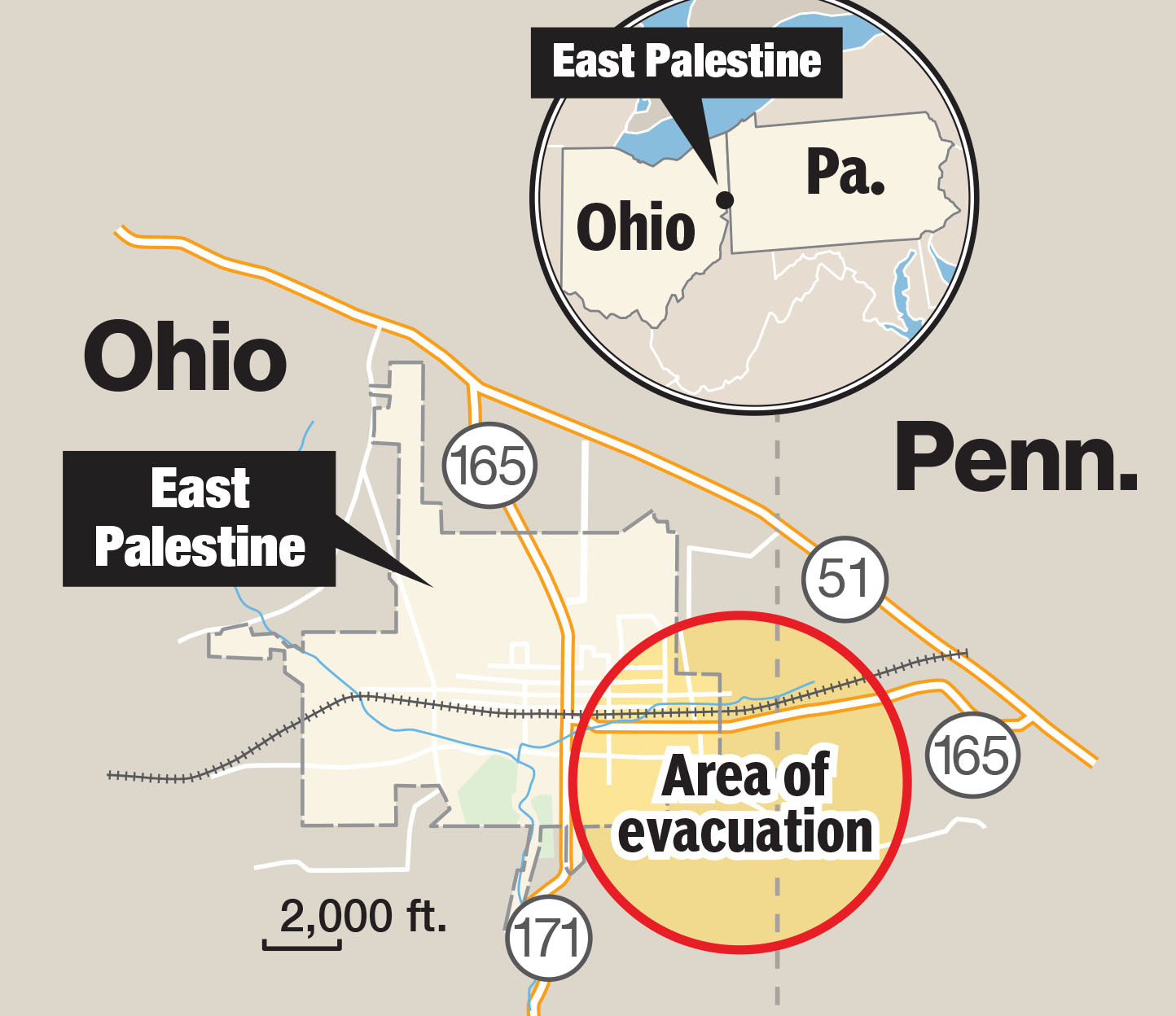Ohio Train Derailment: Investigation Into Lingering Toxic Chemicals In Nearby Structures

Table of Contents
H2: The Extent of the Chemical Spill and its Potential Long-Term Effects
The derailment released a cocktail of hazardous materials, posing significant long-term risks. Understanding the nature and extent of this release is critical to assessing the ongoing threat.
H3: Types of Chemicals Involved
The hazardous materials involved included, but were not limited to:
- Vinyl Chloride: A colorless gas used to make PVC plastic. Exposure can cause dizziness, headaches, and even liver cancer.
- Butyl Acrylate: A colorless liquid used in paints and adhesives. Inhalation can cause respiratory irritation and eye irritation.
- Ethylene Glycol Monobutyl Ether: A solvent used in various industrial applications. Exposure can lead to kidney and liver damage.
These chemicals, and others released in the derailment, pose significant short-term and long-term health risks depending on exposure levels and duration.
H3: Initial Cleanup Efforts and their Limitations
The initial response involved controlled burns of vinyl chloride to prevent a larger explosion. While this prevented a potentially catastrophic event, it released toxic fumes into the atmosphere, raising concerns about air quality and potential respiratory issues for nearby residents. The cleanup process also faced limitations due to the sheer volume of spilled chemicals and the complex nature of the contamination. Effective hazard mitigation and environmental remediation require sophisticated strategies and resources.
H3: Assessing the Persistence of Chemicals in the Environment
These chemicals can persist in the environment for extended periods. Vinyl chloride, for instance, can volatilize and contaminate air, while others can leach into the soil and groundwater, potentially contaminating drinking water sources. Soil contamination and groundwater pollution represent significant long-term environmental challenges, requiring extensive environmental testing and monitoring.
H2: Investigation into Contamination of Nearby Structures
The investigation into the contamination of nearby structures is ongoing and crucial for assessing the risks to residents and businesses.
H3: Testing Procedures and Methodology
Testing procedures involve a multi-pronged approach including:
- Air Quality Testing: Measuring levels of volatile organic compounds (VOCs) in the air inside and outside structures.
- Water Testing: Analyzing water samples for the presence of contaminants.
- Material Sampling: Testing soil, building materials (like drywall and insulation), and other surfaces for chemical residues.
This comprehensive environmental monitoring utilizes advanced toxicological analysis to determine the extent and nature of the contamination. Accurate sample collection is critical to ensuring reliable results.
H3: Findings and Preliminary Results
Preliminary findings, while still incomplete, have revealed varying levels of contamination in some homes and businesses near the derailment site. Specific areas showing higher concentrations are under intense scrutiny. Further analysis and reporting are expected to provide a clearer picture of the extent of contamination and the associated health risks.
H3: Impact on Residents and Businesses
The derailment has had a profound impact on residents and businesses. Many report experiencing respiratory problems, headaches, and other health issues. The economic consequences are also significant, with businesses facing closures and property values potentially impacted by the contamination. The community impact is substantial, demanding comprehensive support and accountability.
H2: Long-Term Health Concerns and Monitoring
The long-term health implications of exposure to these chemicals are a major concern.
H3: Potential Health Effects of Exposure
Exposure to vinyl chloride, butyl acrylate, and other released chemicals can lead to a range of short and long-term health effects, including:
- Respiratory problems
- Liver damage
- Kidney damage
- Increased cancer risk
- Neurological issues
The severity of these long-term health effects depends on factors like the level and duration of exposure.
H3: Ongoing Health Monitoring and Support Services
Several health monitoring programs and support services have been established to assist affected residents. These initiatives provide crucial medical monitoring and resources to address immediate health concerns and track potential long-term effects. Community support plays a critical role in providing emotional and practical assistance.
H3: Legal Ramifications and Accountability
Several lawsuits have been filed against the railroad company and other involved parties. These legal actions aim to hold those responsible accountable for the damages caused by the derailment, including the cost of cleanup, medical care, and property devaluation. The pursuit of liability will be a long and complex process.
3. Conclusion
The investigation into the lingering toxic chemicals from the Ohio train derailment is ongoing and crucial. The findings so far highlight the potential for long-term health and environmental consequences. The need for continued environmental testing, health monitoring, and community support remains paramount. Stay informed about the ongoing investigations into the Ohio train derailment and the lingering toxic chemicals affecting nearby structures. Your health and safety are paramount. Contact your local health authorities or the relevant government agencies if you have any concerns regarding potential exposure. The long-term effects of this Ohio train derailment, and its lingering toxic chemicals, demand sustained vigilance and comprehensive response.

Featured Posts
-
 Oklahoma City Thunder Vs Memphis Grizzlies A Crucial Matchup
May 08, 2025
Oklahoma City Thunder Vs Memphis Grizzlies A Crucial Matchup
May 08, 2025 -
 Resurgimiento Del Psg Derrota Del Lyon En Casa
May 08, 2025
Resurgimiento Del Psg Derrota Del Lyon En Casa
May 08, 2025 -
 Greenland Increased Us Spying Activity
May 08, 2025
Greenland Increased Us Spying Activity
May 08, 2025 -
 Hargreaves Predicts Arsenal Psg Champions League Showdown
May 08, 2025
Hargreaves Predicts Arsenal Psg Champions League Showdown
May 08, 2025 -
 360 Etf
May 08, 2025
360 Etf
May 08, 2025
Latest Posts
-
 The Long Walk Trailer Breakdown Exploring Kings Intense Dystopian World
May 08, 2025
The Long Walk Trailer Breakdown Exploring Kings Intense Dystopian World
May 08, 2025 -
 Oklahoma Citys Tough Road Ahead Previewing The Grizzlies Game
May 08, 2025
Oklahoma Citys Tough Road Ahead Previewing The Grizzlies Game
May 08, 2025 -
 The Long Walk Trailer A Glimpse Into Stephen Kings Dystopian Thriller
May 08, 2025
The Long Walk Trailer A Glimpse Into Stephen Kings Dystopian Thriller
May 08, 2025 -
 Can The Thunder Overcome Memphis A Gameday Analysis
May 08, 2025
Can The Thunder Overcome Memphis A Gameday Analysis
May 08, 2025 -
 First Look The Long Walk Trailer Reveals A Disturbing Stephen King Story
May 08, 2025
First Look The Long Walk Trailer Reveals A Disturbing Stephen King Story
May 08, 2025
